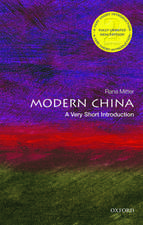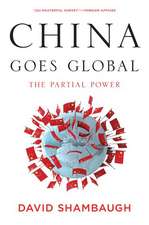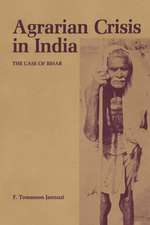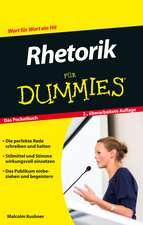The SAGE Handbook of Modern Japanese Studies
Editat de James D Babben Limba Engleză Hardback – 14 dec 2014
- Roger Goodman, Nissan Professor of Modern Japanese Society, University of Oxford
"I know no better book for an accessible and up-to-date introduction to this complex subject than The SAGE Handbook of Modern Japan Studies."
- Hiroko Takeda, Associate Professor, Organization for Global Japanese Studies, University of Tokyo
"Pioneering and nuanced in analysis, yet highly accessible and engaging in style."
- Yoshio Sugimoto, Emeritus Professor, La Trobe UniversityThe SAGE Handbook of Modern Japanese Studies includes outstanding contributions from a diverse group of leading academics from across the globe. This volume is designed to serve as a major interdisciplinary reference work and a seminal text, both rigorous and accessible, to assist students and scholars in understanding one of the major nations of the world.
James D. Babb is a Senior Lecturer in the School of Geography, Politics and Sociology at Newcastle University.
Preț: 1137.00 lei
Preț vechi: 1476.63 lei
-23% Nou
Puncte Express: 1706
Preț estimativ în valută:
217.57€ • 227.62$ • 180.73£
217.57€ • 227.62$ • 180.73£
Carte tipărită la comandă
Livrare economică 31 martie-05 aprilie
Preluare comenzi: 021 569.72.76
Specificații
ISBN-13: 9781848606630
ISBN-10: 184860663X
Pagini: 672
Dimensiuni: 184 x 246 x 57 mm
Greutate: 1.35 kg
Ediția:1
Editura: SAGE Publications
Colecția Sage Publications Ltd
Locul publicării:London, United Kingdom
ISBN-10: 184860663X
Pagini: 672
Dimensiuni: 184 x 246 x 57 mm
Greutate: 1.35 kg
Ediția:1
Editura: SAGE Publications
Colecția Sage Publications Ltd
Locul publicării:London, United Kingdom
Recenzii
The chapters in this handbook each provide concise, up-to-date and highly accessible accounts of the state of the academic field - and how it is likely to develop - across an impressively wide range of topics. As a result, it will be a welcome addition to any reading list for those interested in contemporary Japanese society.
This reference book provides cutting-edge studies of contemporary Japan by leading scholars. It covers a wide-range of topics, including such hitherto little explored areas as heritage management, energy supply and medicine in Japan, thus sensitizing the reader to more diverse aspects of the complex society. It is pioneering and nuanced in analysis, yet highly accessible and engaging in style. The Sage Handbook of Modern Japanese Studies presents an authoritative overview of Japan today and will prove to be a great first port of call for students and the general public interested in this intellectually challenging country.
Japan has undergone profound political, economic and social transformations since the 1990s. I know no better book for an accessible and up-to-date introduction to this complex subject than the SAGE Handbook of Modern Japan Studies. With well-informed overviews on a series of topics by experts in the field, the SAGE Handbook of Modern Japan Studies serves as a pertinent reminder of the place and importance of Japan in the world and its study for the social science research
Its contributions will surely be broadly used in higher education in introduction courses on Japan and in introductory sessions of advanced teaching on Japan.
The SAGE Handbook is a brilliant tool, serves as a very good primer and review of the Anglophone study on Japan, and is far from being impenetrable to the general public. Most chapters have a bibliography roughly equal in page length to their essay, and within this cross-disciplinary study of Japan explicitly execute their own sustained interdisciplinary methods too. So overall, this edited collection is a massive contribution towards a tiny need. Japanese studies have been making such headway that academics might even now say 'Japan is BACK!'. The SAGE Handbook exceeds itself by not just capturing a small portion of that success, but presenting a refreshed and comprehensive review of the state of play that itself inspires appreciation of all manner of study on Japan, and could very well motivate the continuation of the Japan interest boom.
This reference book provides cutting-edge studies of contemporary Japan by leading scholars. It covers a wide-range of topics, including such hitherto little explored areas as heritage management, energy supply and medicine in Japan, thus sensitizing the reader to more diverse aspects of the complex society. It is pioneering and nuanced in analysis, yet highly accessible and engaging in style. The Sage Handbook of Modern Japanese Studies presents an authoritative overview of Japan today and will prove to be a great first port of call for students and the general public interested in this intellectually challenging country.
Japan has undergone profound political, economic and social transformations since the 1990s. I know no better book for an accessible and up-to-date introduction to this complex subject than the SAGE Handbook of Modern Japan Studies. With well-informed overviews on a series of topics by experts in the field, the SAGE Handbook of Modern Japan Studies serves as a pertinent reminder of the place and importance of Japan in the world and its study for the social science research
Its contributions will surely be broadly used in higher education in introduction courses on Japan and in introductory sessions of advanced teaching on Japan.
The SAGE Handbook is a brilliant tool, serves as a very good primer and review of the Anglophone study on Japan, and is far from being impenetrable to the general public. Most chapters have a bibliography roughly equal in page length to their essay, and within this cross-disciplinary study of Japan explicitly execute their own sustained interdisciplinary methods too. So overall, this edited collection is a massive contribution towards a tiny need. Japanese studies have been making such headway that academics might even now say 'Japan is BACK!'. The SAGE Handbook exceeds itself by not just capturing a small portion of that success, but presenting a refreshed and comprehensive review of the state of play that itself inspires appreciation of all manner of study on Japan, and could very well motivate the continuation of the Japan interest boom.
Cuprins
Introduction - James Babb
PART I: LAND, HISTORY AND CULTURE
Modern Japan in History - Andrew Cobbing
Anthropology of Modern Japan - Carolyn Stevens
The Practice of Religion in Japan: An Exploration of the State of the Field - Lucia Dolce
Mass Media in Japan - Katja Valaskivi
Heritage Management in Present-day Japan - Noriaki Nishiyama
Geography’s Contribution in Japanese Studies - Mary McDonald
Regionalism and the Local - Anthony Rausch
PART II: SOCIETY
Education - Robert W. Aspinall
Feminism - Vera Mackie
‘How to Sex’? The Contested Nature of Sexuality in Japan - Mark McLelland
Gender Equity in Japan - Joyce Gelb
Policing in Japan - David T. Johnson
Organised Crime - Peter Hill
PART III: MEDICINE AND HEALTH CARE
A Brief History of Japanese Medicine - Izumi Yokoyama and Michael D. Fetters
Health Care in Japan: Excellent Population Health, Low Medical Expenditures, yet Ambiguous Place of Primary Care - Jonathan E. Rodnick, Izumi Yokoyama and Michael D. Fetters
Medical Education in Japan - Michael D. Fetters and Izumi Yokoyama
Bioethics and Medico-legal Issues in Japan - Michael D. Fetters
Mental Health in Japan - Denise St. Arnault
PART IV: POLITICS AND FOREIGN RELATIONS
Political 'Science' and the Study of Japanese Politics - James Babb
Parties and Election in Japan - Kenneth Mori McElwain
Postwar Democracy - Sherry Martin Murphy
Civil Society in Japan - Yuko Kawato, Robert Pekkanen and Hidehiro Yamamoto
Japan’s International Relations - Christopher W. Hughes
Japan and Globalization - Hugo Dobson
Japan-United States Relations - Paul Midford
Foreign Relations with China - Caroline Rose
PART V: ECONOMY
The Japanese Economy - Marcus Rebick
Japanese Business and Management - Parissa Haghirian
Japanese Consumers and Consumerism - Parissa Haghirian
Labor Relations - Akira Suzuki
Foreign Workers in Japan - Gabriele Vogt
Agriculture - Aurelia George Mulgan
Energy - Alexandru P. Luta and Paul Midford
PART I: LAND, HISTORY AND CULTURE
Modern Japan in History - Andrew Cobbing
Anthropology of Modern Japan - Carolyn Stevens
The Practice of Religion in Japan: An Exploration of the State of the Field - Lucia Dolce
Mass Media in Japan - Katja Valaskivi
Heritage Management in Present-day Japan - Noriaki Nishiyama
Geography’s Contribution in Japanese Studies - Mary McDonald
Regionalism and the Local - Anthony Rausch
PART II: SOCIETY
Education - Robert W. Aspinall
Feminism - Vera Mackie
‘How to Sex’? The Contested Nature of Sexuality in Japan - Mark McLelland
Gender Equity in Japan - Joyce Gelb
Policing in Japan - David T. Johnson
Organised Crime - Peter Hill
PART III: MEDICINE AND HEALTH CARE
A Brief History of Japanese Medicine - Izumi Yokoyama and Michael D. Fetters
Health Care in Japan: Excellent Population Health, Low Medical Expenditures, yet Ambiguous Place of Primary Care - Jonathan E. Rodnick, Izumi Yokoyama and Michael D. Fetters
Medical Education in Japan - Michael D. Fetters and Izumi Yokoyama
Bioethics and Medico-legal Issues in Japan - Michael D. Fetters
Mental Health in Japan - Denise St. Arnault
PART IV: POLITICS AND FOREIGN RELATIONS
Political 'Science' and the Study of Japanese Politics - James Babb
Parties and Election in Japan - Kenneth Mori McElwain
Postwar Democracy - Sherry Martin Murphy
Civil Society in Japan - Yuko Kawato, Robert Pekkanen and Hidehiro Yamamoto
Japan’s International Relations - Christopher W. Hughes
Japan and Globalization - Hugo Dobson
Japan-United States Relations - Paul Midford
Foreign Relations with China - Caroline Rose
PART V: ECONOMY
The Japanese Economy - Marcus Rebick
Japanese Business and Management - Parissa Haghirian
Japanese Consumers and Consumerism - Parissa Haghirian
Labor Relations - Akira Suzuki
Foreign Workers in Japan - Gabriele Vogt
Agriculture - Aurelia George Mulgan
Energy - Alexandru P. Luta and Paul Midford
Descriere
A cutting edge and cross-disciplinary exploration of the broad field of Japanese Studies. An international team of experts explore land, history and culture, society, medicine, the economy, and politics and foreign relations.














